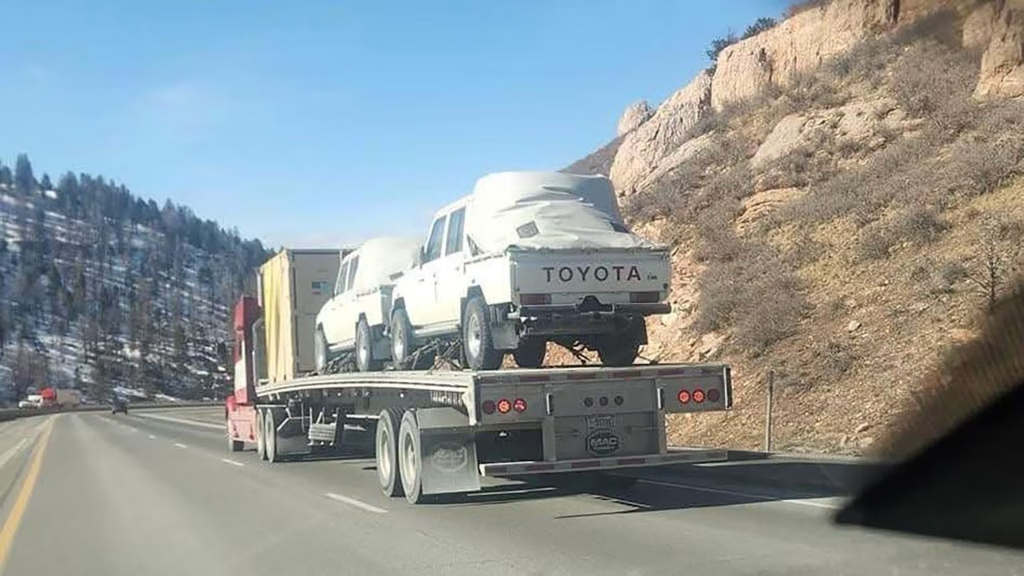Wyoming’s Interstate 80 became an impromptu car show when two ultra-rare Toyota Land Cruiser 79 Series vehicles were spotted on a flatbed trailer near Laramie, stopping traffic and turning heads of automotive enthusiasts.
These aren’t your typical Land Cruisers. The white four-door cab trucks represent a unicorn in American automotive circles – vehicles that have never been legally sold in the United States and are commonly seen in global conflict zones equipped with weaponry ranging from machine guns to rocket launchers.
Ryan Martinez captured the unusual sight while traveling to a wedding. “It’s not something you see every day in the U.S.,” he told Cowboy State Daily, before sharing his photos on social media where they quickly went viral among vehicle enthusiasts.
Land Cruiser expert Jeremiah Proffitt identified the trucks as HZJ79s, likely imported from Saudi Arabia. “If you look at footage of any Middle Eastern country at war, you’ll see 70 Series trucks with rocket launchers, machine guns, missiles, and all kinds of stuff on the back,” Proffitt explained. “Companies exist that sell Toyota 70 series directly to Al-Qaeda, so the U.S. military has an interest in knowing how these technicals maneuver and work.”
Their presence on American roads remains a mystery, though Proffitt believes they were headed to a military contractor for research purposes. “They’re in the country temporarily, just like citizens from a different country with a visa,” he said, warning that illegal imports have been confiscated and destroyed by government authorities in the past.
The 70 Series Land Cruiser has achieved legendary status worldwide since Toyota began production in 1984. Described as “the workhorse of the third-world country,” these vehicles command two-year waiting lists in Australia and dominate rugged terrain across Africa, Central America, and South America.
Despite their popularity abroad, Toyota never brought the utilitarian 70 Series to America. The company determined the U.S. market preferred comfort over capability – “more interested in cup holders than off-road ability,” as Proffitt put it. Additionally, significant redesigns would be required to meet U.S. safety and emissions standards, making entry into the American market economically unattractive for Toyota.
Automotive writer Aaron Turpen agrees that market analysis drives these decisions. “It’s the same reason nobody makes small, two-door pickup trucks. Nobody wants to buy them, so it’d be a waste of time to make them,” he said, noting that most Land Cruisers sold in America rarely leave paved roads despite their off-road pedigree.
For determined Americans, there are limited pathways to 70 Series ownership. The 25-year import rule now allows the earliest models (1984-1999) to be legally imported. Proffitt’s company specializes in high-end Land Cruiser restorations and has built approximately 30 custom 70 Series trucks using imported bodies on domestic chassis – projects that can cost up to $200,000 despite the vehicles selling for around $35,000 new in Central America.
As for those willing to break the rules, Proffitt reluctantly admits an alternative exists: “Someone could get on a plane to Nicaragua, buy one of those Land Cruisers at a dealership, and drive it back to Wyoming. You couldn’t legally import or get U.S. plates for it, but if you wanted to take the risk… it has happened.”
For now, spotting these forbidden off-road legends on American highways remains a rare event that continues to fuel desire among enthusiasts who, as Proffitt simply states, “always want what we can’t have.”
